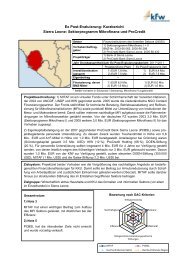Making partnerships work for health, focusing on low-income countries
Making partnerships work for health, focusing on low-income countries
Making partnerships work for health, focusing on low-income countries
Create successful ePaper yourself
Turn your PDF publications into a flip-book with our unique Google optimized e-Paper software.
Klaus Brill Panel 1: Involvement of the private sector – cooperati<strong>on</strong> and coordinati<strong>on</strong><br />
1. Social marketing<br />
Bayer Schering Pharma has already<br />
been involved in the ‘Social Marketing<br />
<str<strong>on</strong>g>for</str<strong>on</strong>g> Change’ project, called SOMARC<br />
<str<strong>on</strong>g>for</str<strong>on</strong>g> short, since the 1980s. This project<br />
was developed by the USAID and is organized<br />
as fol<strong>low</strong>s: companies <str<strong>on</strong>g>work</str<strong>on</strong>g>ing<br />
within the project are prepared to offer<br />
a specific product in a selected developing<br />
country to a c<strong>on</strong>siderably reduced<br />
price. This there<str<strong>on</strong>g>for</str<strong>on</strong>g>e enables women <strong>on</strong><br />
<strong>low</strong> <strong>income</strong>s to af<str<strong>on</strong>g>for</str<strong>on</strong>g>d the product. In<br />
return, the organizati<strong>on</strong> – in this case<br />
the USAID – provides support by instigating<br />
market development measures<br />
and offering educati<strong>on</strong> campaigns and<br />
training programmes.<br />
2. Cooperati<strong>on</strong> with n<strong>on</strong>governmental<br />
organizati<strong>on</strong>s (NGOs)<br />
Over the years, n<strong>on</strong>-governmental organizati<strong>on</strong>s<br />
have successfully established<br />
family planning programmes that<br />
have improved access to c<strong>on</strong>traceptives<br />
and made them more widely available.<br />
Bayer Schering Pharma has also been<br />
active here in partnership with corresp<strong>on</strong>ding<br />
NGOs. Partners with large<br />
net<str<strong>on</strong>g>work</str<strong>on</strong>g>s in the field of family planning<br />
include the United Nati<strong>on</strong>s Populati<strong>on</strong><br />
Fund (UNFPA), the Internati<strong>on</strong>al<br />
Planned Parenthood Federati<strong>on</strong> (IPPF),<br />
Populati<strong>on</strong> Services Internati<strong>on</strong>al (PSI)<br />
and Marie Stopes Internati<strong>on</strong>al (MSI).<br />
The NGO model is intended to reach as<br />
many young people women and men as<br />
possible through educati<strong>on</strong> and market-<br />
ing campaigns so that the number of<br />
users of family planning methods increases<br />
further. These programmes are<br />
funded by the public and n<strong>on</strong>-public<br />
sectors. In this cooperative model,<br />
the c<strong>on</strong>traceptives are provided by the<br />
NGOs either free of charge or <str<strong>on</strong>g>for</str<strong>on</strong>g> an extremely<br />
<strong>low</strong> price.<br />
‘Less<strong>on</strong>s learned’ from both models<br />
Both methods provide elementary cornerst<strong>on</strong>es<br />
in disseminating family planning<br />
methods and making them available<br />
to a greater number of women.<br />
However, a perquisite <str<strong>on</strong>g>for</str<strong>on</strong>g> the success<br />
and sustainability of the family planning<br />
programmes is the c<strong>on</strong>tinued provisi<strong>on</strong><br />
of funding during financial crises.<br />
In terms of sustainability, the fol<strong>low</strong>ing<br />
aspects should be c<strong>on</strong>sidered:<br />
The projects initiated by the various<br />
family planning organizati<strong>on</strong>s can be<br />
deemed to be sustainable and viable in<br />
the l<strong>on</strong>g term if l<strong>on</strong>g-term financing is<br />
secured and companies and NGOs provide<br />
a sustained basis <str<strong>on</strong>g>for</str<strong>on</strong>g> cooperati<strong>on</strong>.<br />
This improves the provisi<strong>on</strong> of c<strong>on</strong>traceptives<br />
(planning security <str<strong>on</strong>g>for</str<strong>on</strong>g> both<br />
partners) and facilitates market development<br />
measures that extend bey<strong>on</strong>d<br />
the respective project phase. In other<br />
words: develop str<strong>on</strong>g <str<strong>on</strong>g>partnerships</str<strong>on</strong>g>.<br />
In both models, the c<strong>on</strong>traceptives are<br />
provided free of charge or at cost price.<br />
This means that most of these schemes<br />
are not in themselves commercially viable<br />
in the l<strong>on</strong>g term but are dependent<br />
<strong>on</strong> subsidies.<br />
This in turn means that it is often not<br />
possible to guarantee the sustainability<br />
of the projects since the projects mostly<br />
do not provide measures to guarantee<br />
the c<strong>on</strong>tinued existence in the market<br />
<strong>on</strong> completi<strong>on</strong> of the project phase.<br />
A new approach: ‘2nd tier marketing’<br />
In additi<strong>on</strong> to family planning programmes<br />
based <strong>on</strong> financial support,<br />
new approaches can help increase the<br />
availability of the c<strong>on</strong>traceptives while<br />
at the same time c<strong>on</strong>siderably anchoring<br />
the c<strong>on</strong>cept of sustainability<br />
in terms of ‘less<strong>on</strong>s learned’ and ‘best<br />
practices’. We there<str<strong>on</strong>g>for</str<strong>on</strong>g>e need approaches<br />
which, fol<strong>low</strong>ing a phase of financial<br />
support, are able to pay <str<strong>on</strong>g>for</str<strong>on</strong>g> themselves<br />
commercially.<br />
The ‘2nd tier marketing’ approach provides<br />
such as possibility <str<strong>on</strong>g>for</str<strong>on</strong>g> Bayer Schering<br />
Pharma: a worldwide available and<br />
proven oral c<strong>on</strong>traceptive (Microgyn<strong>on</strong>)<br />
is being launched <strong>on</strong> the market in developing<br />
<strong>countries</strong> and made available<br />
at an af<str<strong>on</strong>g>for</str<strong>on</strong>g>dable price to women with<br />
<strong>low</strong> to middle <strong>income</strong>s <strong>on</strong> a sustainable<br />
and permanent basis. The price is greater<br />
than is usual <str<strong>on</strong>g>for</str<strong>on</strong>g> a social marketing<br />
project but nevertheless significantly<br />
<strong>low</strong>er than the standard brands in socalled<br />
high-price private markets, also<br />
known as ‘first tier’ markets. Particu-<br />
larly middle class women in developing<br />
<strong>countries</strong> benefit from such a marketing<br />
and sales model. Since this ‘2nd<br />
tier marketing’ model can also achieve<br />
100 percent commercial self-sufficiency,<br />
this approach is also 100 percent sustainable.<br />
With USAID we have c<strong>on</strong>cluded a collaborati<strong>on</strong><br />
agreement as the first industrial<br />
partner. This partnership in ‘2nd tier<br />
marketing’, which is called the ‘Bayer<br />
Schering Pharma C<strong>on</strong>traceptive Security<br />
Initiative’, will enable a large number<br />
of women in first of all 11 African <strong>countries</strong><br />
to access high quality reliable horm<strong>on</strong>al<br />
c<strong>on</strong>traceptives. The pilot project<br />
is beginning in Ethiopia, Tanzania and<br />
Uganda and will then be extended to<br />
other <strong>countries</strong>. If this marketing and<br />
sales approach proves successful, we<br />
also have plans to extend this model to<br />
other products.<br />
C<strong>on</strong>clusi<strong>on</strong>s<br />
Str<strong>on</strong>g private-public <str<strong>on</strong>g>partnerships</str<strong>on</strong>g> make<br />
a valuable c<strong>on</strong>tributi<strong>on</strong> to achieving the<br />
MDGs. Here the proven family planning<br />
programmes must receive l<strong>on</strong>g-term financial<br />
support and new approaches,<br />
such as the Bayer Schering Pharma<br />
C<strong>on</strong>traceptive Security Initiative, must<br />
provide additi<strong>on</strong>al impetus.<br />
74 75


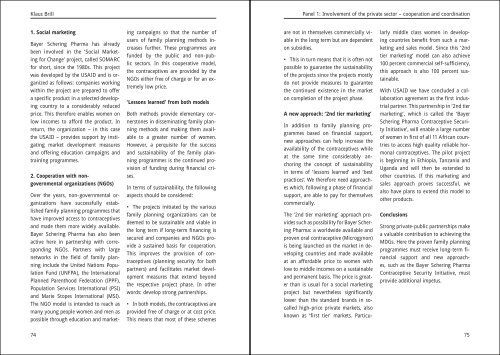
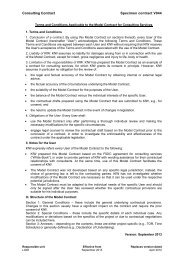
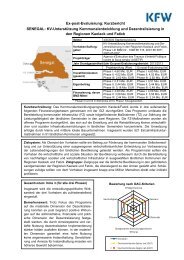
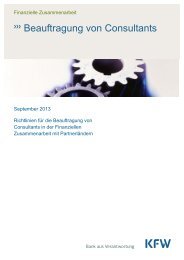
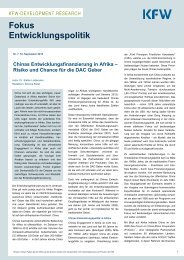
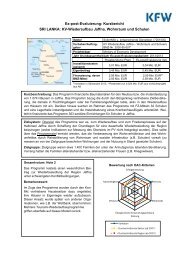
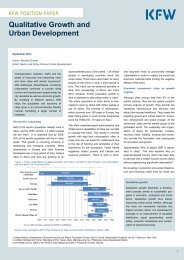
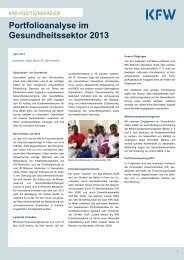
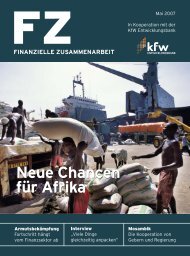
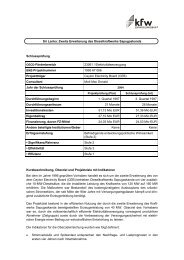
![Wasserversorgung Luang-Prabang I+II [2004] (PDF, 97 KB) - KfW ...](https://img.yumpu.com/21663442/1/184x260/wasserversorgung-luang-prabang-i-ii-2004-pdf-97-kb-kfw-.jpg?quality=85)
![Entwicklungsbank NDB I+II [2002] (PDF, 88 KB) - KfW ...](https://img.yumpu.com/21363284/1/184x260/entwicklungsbank-ndb-i-ii-2002-pdf-88-kb-kfw-.jpg?quality=85)
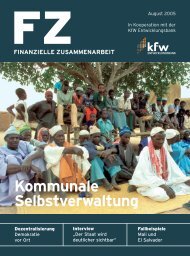

![Instandsetzung Baharia-Eisenbahnlinie I und II [2004] (PDF, 123 KB)](https://img.yumpu.com/21289660/1/184x260/instandsetzung-baharia-eisenbahnlinie-i-und-ii-2004-pdf-123-kb.jpg?quality=85)
